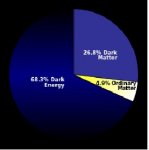Where do you come up with this?

I mean that seriously. Have you been working on this lately.
No, I've been interested in the self-supporting aspects of science since I was a kid. When I was in my 30s I got interested in the philosophical problem of knowledge, epistemology, and I re-appreciated the scientific method in all its wondrous beauty.
You'll notice in my comment that my approach to describing the topic of scientific knowledge is backward-looking as well as forward-looking. Your understanding of your theory must work backwards by not contradicting any past observations (or showing that they were wrong) and forward by predicting future observations and not being contradicted by them. The reason that's so important is because the forward-looking aspect of science allows us a degree of inductive reasoning, which is a huge problem in epistemology.
Let me explain it this way: how do you know The Sun will rise in the east tomorrow?
a) Because it always has, more or less.
b) Because there is an entire body of knowledge around orbital mechanics and physics that indicate that it will rise tomorrow and that the only way it wouldn't would be if some tremendous force were applied to the Earth or The Sun to prevent it; there is no such force that we see any sign of - no black hole or rogue star or rogue planet coming to knock The Earth out of its orbit - therefore we can safely say that it will rise tomorrow. More importantly, if it somehow doesn't, we'll have a framework that will explain why it didn't. (e.g.: rogue black hole we didn't notice, whatever)
I'm not an astrophysicist, I'm just a big fan of astrophysics and most of the sciences, so I have gained a working surface knowledge of a lot of related stuff.
The essence of an infinite nothing to start all time of everything allows a theory to account for just about anything as long as enough variable can get invented (ie 'dark' stuff) to cover all the contradictions of the original theory.
Do you understand how scientists know that Dark Matter and Dark Energy are there?
They bend light.
Which means that there is substantial mass to them. For all intents and purposes in Einstein's universe we could say that having mass means you exist.
I'm mean really, come on, the very existence of a big bang contradicts itself. What if every Black Hole has a BB on the other side, then the Mutant race to seize the Infinity Gauntlet is on, and we're missing the boat because we dissed Odin.
You're going to have to do a whole lot better than that to overthrow Einsteinian relativity (which is what the big bang rests its foundations on)!!! For one thing, what you just described is as if you mistook Hollywood entertainments like "Interstellar" for documentaries. They are not.
What is on the other side of a black hole? Nothing. A black hole is just a great huge mass in a very small space that warps local space-time hugely. If you fall into a black hole you don't come out the other side, you become a very tiny scum of collapsed matter on the surface of the singularity and that's pretty much it. In fact we
know that to be true! Because observation ("look! black holes are spinning!") matches theoretical prediction ("matter infalling through an accretion disk will impart its momentum, however tiny that may be, to the black hole") ... sure enough, most black holes with accretion disks are spinning at close to the speed of light. How cool is that? It's also confirmation that mass that infalls into a black hole behaves as mass is wont to do, and stays there.
And the only way they say the BB predicted the CMB is because duh, everything came from the BB.
Please if you want to trot around and try to pretend that modern cosmology is based on circular reasoning, you shouldn't display such ignorance in the lime-light; it's embarrassing.
You're trying to imply that there is circular reasoning going on when, in fact, it's exactly the opposite - the backward-looking aspects of the theory go back to basic principles of physics and forward as logical consequences of them. The CMB is not a "result of the big bang" as much as it's a "predictable stage in what would happen if there had been a big bang" and the fact that that predicted stage happened is supporting evidence.
It was the 'primordial ooze' of everything, except all the other stuff from the new theories that the old theory needs to not contradict itself again.
That is word salad to me.
Maybe you can do better. Do you realize that if you really think you can disprove the big bang, at this point, you would be a more famous physicist than Einstein and Bohr and Feynman combined? You'd be right up there with Newton. So don't publish it here, do it in some academic journal not a game forum.
- - - - -
The universe won't continue to expand forever.
Actually, it may. Watch that Lawrence Krauss video I linked earlier.
It appears that Dark Matter/Energy have enough push to continue to speed up the expansion of the universe - past the speed of light - which will have some very very interesting side-effects.
- - - - -
My theory on the universe is that the big bang or expansion was not the beginning but a cycle. Maybe the universe is timeless but expands so far then shrinks back and begins again with a bang over and over.
Your theory appears to be conclusively wrong.
That's why the discovery of Dark Matter/Energy is so important. It appears we are in an expansionary universe that will not contract. It is actually accellerating its expansion.

